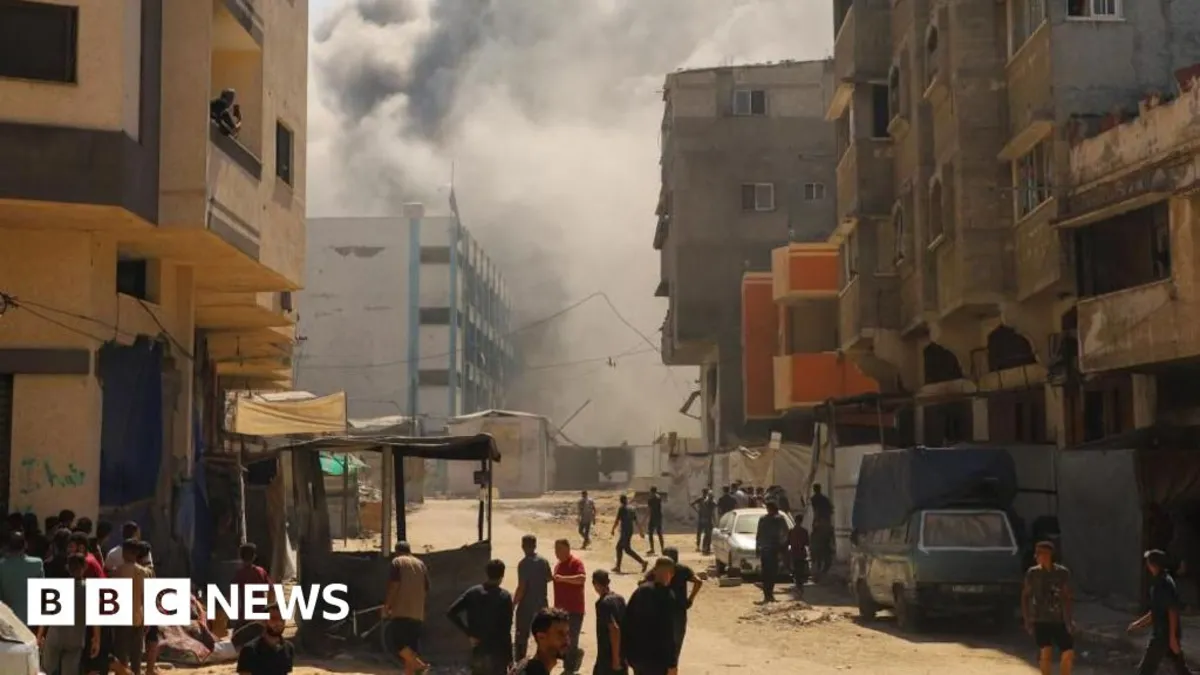
Israeli forces have significantly intensified their military operations in Gaza City, launching a series of heavy air strikes that represent a marked escalation from earlier phases of the ongoing conflict. Unlike previous military engagements, the current offensive relies predominantly on aerial bombardments, resulting in the destruction of entire apartment blocks and large concrete structures, which have been reduced to rubble.
The recent surge in air strikes has led to alarming levels of civilian displacement, prompting Israeli authorities to issue urgent warnings for all residents of Gaza City to evacuate immediately in anticipation of a significant ground offensive. According to the Israeli Defense Forces (IDF), approximately 250,000 individuals have fled the city, moving southward to escape the escalating violence.
Amidst this chaos, the IDF reported the destruction of a high-rise building purportedly used for planning and executing terrorist attacks against Israeli troops. Israeli Prime Minister Benjamin Netanyahu has stated that Gaza City serves as Hamas's last major stronghold, intensifying the urgency of the military campaign.
The escalation has drawn widespread international criticism, with the United Nations warning that an intensified offensive in an area already facing a declared famine could plunge civilians into an even deeper humanitarian catastrophe. Gaza City, the largest urban center in the territory, holds significant historical and cultural importance for Palestinian political and social life.
Residents have reported that the Israeli military has been targeting schools and makeshift shelters, often providing warnings just moments before bombardments. Many families have been forced to flee under the cover of darkness toward western Gaza. Saly Tafeesh, a mother sheltering in the city, shared her harrowing experience: "We escaped certain death, my husband, our three children, and I. My brother died in my arms after being shot by a quadcopter drone. We ran in the dark to the west of Gaza."
The Israeli military has advised residents to evacuate to the southern parts of the territory; however, many families cite financial constraints as a barrier, with evacuation costs reaching up to $1,100 (£800). In contrast, Hamas has ramped up its rhetoric, urging residents to remain in Gaza City and resist evacuation. Rubein Khaled, a father of nine preparing to move south, expressed his frustration: "The Hamas preacher at Friday prayers accused anyone leaving Gaza City of being a coward running from the battlefield. But why doesn't he tell Hamas leaders to surrender and release the Israeli hostages so this war can stop? We don't want to leave either, but we have no choice."
While Israeli forces have not yet reached some eastern neighborhoods—which have remained largely intact since earlier raids in January—the current military campaign suggests a potential strategy to dismantle entire districts. This approach has prompted criticism and concern from various international entities.
In a recent interview with the BBC, a spokesman for the Qatari foreign ministry voiced strong condemnation of Israeli Prime Minister Netanyahu, labeling him as a "problem" for the international community. Majed Al-Ansari stated, "He is not somebody who is listening to anybody right now, who is listening to any reason, and we have to collectively stop him in his tracks." He further argued that recent strikes, including one in Doha that resulted in the deaths of five Hamas members and a Qatari security officer, indicate that Netanyahu never intended to pursue a peace deal to end the conflict in Gaza.
Qatar's Prime Minister Mohammed bin Abdulrahman al-Thani revealed that his country did not receive advance warning of the strike, only being informed by a U.S. official ten minutes post-attack. Earlier in the week, al-Thani had met with U.S. President Donald Trump and other officials, showcasing the delicate balance of diplomatic relations amid escalating tensions.
As the situation unfolds, the international community continues to monitor the developments closely. U.S. Senator Marco Rubio is expected to travel to Israel this weekend in a show of solidarity, coinciding with an upcoming UN meeting where France and the UK are anticipated to formally recognize a Palestinian state. The situation in Gaza City remains critical, with humanitarian concerns at the forefront of discussions.